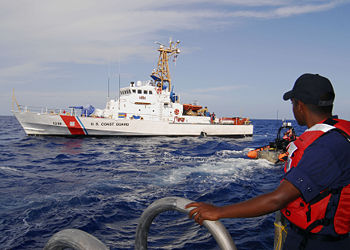USCG Island class: Difference between revisions
imported>George Swan m (fix refs) |
imported>Meg Taylor No edit summary |
||
| Line 6: | Line 6: | ||
As originally built these vessels were crewed with sixteen personnel, were armed with a 25mm [[autocannon]], and were capable of speeds of approximately thirty knots. | As originally built these vessels were crewed with sixteen personnel, were armed with a 25mm [[autocannon]], and were capable of speeds of approximately thirty knots. | ||
Following [[al Qaeda]]'s attacks on September 11, 2001, a plan called "[[Project Deepwater]]" was to modernize and re-equip the Coast Guard's fleet. | Following [[al-Qaeda]]'s attacks on September 11, 2001, a plan called "[[Project Deepwater]]" was to modernize and re-equip the Coast Guard's fleet. | ||
The Island class cutters were to be lengthened from 110 to 123 feet. | The Island class cutters were to be lengthened from 110 to 123 feet. | ||
The crew accommodation were to be modernized to comply with a new policy for all cutters to accommodate crews of mixed sex. | The crew accommodation were to be modernized to comply with a new policy for all cutters to accommodate crews of mixed sex. | ||
The lengthening added a [[stern launching ramp]] designed so the vessels could launch and retrieve a water-jet propelled [[rigid-hull | The lengthening added a [[stern launching ramp]] designed so the vessels could launch and retrieve a water-jet propelled [[rigid-hull inflatable]] [[Short Range Prosecutor]] high speed pursuit boat, without coming to a halt first. | ||
Initially the first eight vessels to be modernized were described as a success. | Initially the first eight vessels to be modernized were described as a success. | ||
| Line 62: | Line 62: | ||
==References== | ==References== | ||
{{reflist}} | |||
Revision as of 22:32, 31 December 2013

United States Coast Guard Island class Cutter Chandeleur, one of the unmodified 110 foot vessels.
The United States Coast Guard Island class of cutters included approximately five dozen vessels. As originally built these vessels were crewed with sixteen personnel, were armed with a 25mm autocannon, and were capable of speeds of approximately thirty knots.
Following al-Qaeda's attacks on September 11, 2001, a plan called "Project Deepwater" was to modernize and re-equip the Coast Guard's fleet. The Island class cutters were to be lengthened from 110 to 123 feet.
The crew accommodation were to be modernized to comply with a new policy for all cutters to accommodate crews of mixed sex.
The lengthening added a stern launching ramp designed so the vessels could launch and retrieve a water-jet propelled rigid-hull inflatable Short Range Prosecutor high speed pursuit boat, without coming to a halt first.
Initially the first eight vessels to be modernized were described as a success. But later it emerged that the lengthened stern were structurally unsound, and the converted vessels were unseaworthy.[1][2][3] The conversion had also gone several multiples over-budget. In 2007 the Coast Guard took over direct control of the Deepwater Program from the Prime Contractor. All current 123' cutters are now still in commission, but out of service.[4]
Forty-nine of the original Island class vessels remain in active service. The unmodified vessels still have to come to a halt to launch a boat.
References
- ↑ Thad Allen. STATEMENT BY ADM. THAD ALLEN on the converted 123-foot patrol boats and changes to the Deepwater acquisition program, United States Coast Guard, 2007-04-17. Retrieved on 2008-06-26. mirror
- ↑ Jason Miller. Justice Department investigating Deepwater for possible fraud, Federal Computer Week, 2007-04-18. Retrieved on 2008-06-26.
- ↑ Renae Merle, Spencer Hsu. Coast Guard To Take Over 'Deepwater': Move Wrests Control From Consortium of Contractors, Washington Post, 2007-04-17, p. D01. Retrieved on 2008-06-01. mirror
- ↑ US Coast Guard Taking Over Lead Role for Deepwater Program, Defense Industry Daily, 2007-04-18. Retrieved on 2008-06-26. mirror
